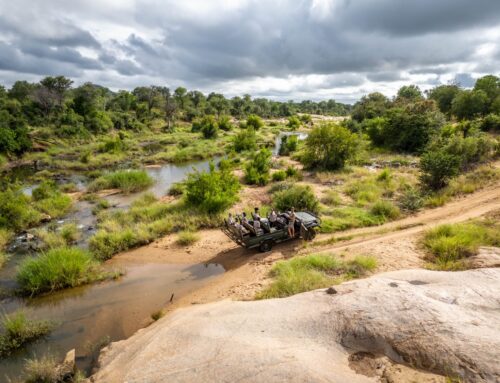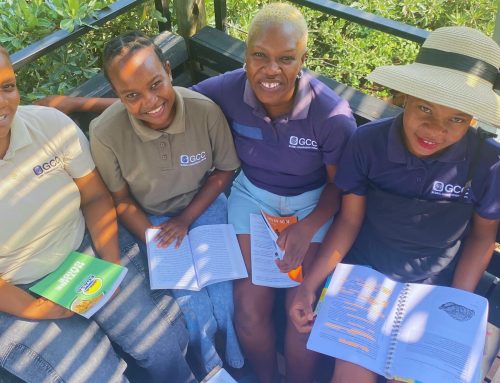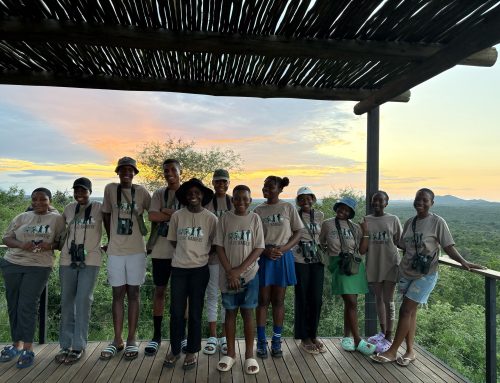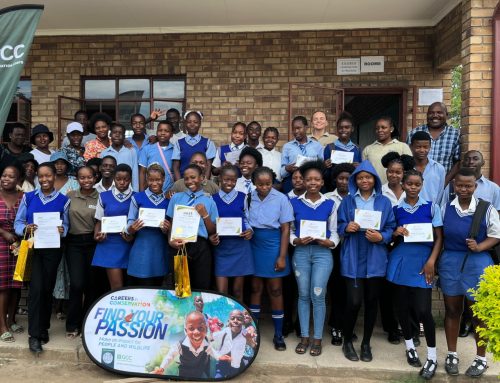Godfrey Mlambo is from Mkhuhlu, outside of Hazyview, and was one of 16 young men and women who earned a GCC scholarship place at the Southern African Wildlife College. GCC’s founder, Matt Lindenberg, talks to him about the selection process and what becoming a field ranger means to him.
Matt Lindenberg: What inspired you to become a ranger?
Godfrey Mlambo: When I look at our economy and the way people are behaving, the way they are treating our animals and everything that belongs to nature, even the trees, it worries me. This inspired me to take a step and become a field ranger where I could have an opportunity to conserve some of the things in nature and I got a chance and an opportunity to do so.
ML: How did you hear about the job of a ranger?
GM: My uncle works at Malelane as a field ranger sergeant in Kruger National Park, and has won some awards, so he has really inspired me to follow in his footsteps to become a future ranger.
ML: Did you have any previous wildlife conservation experience before coming to the Southern African Wildlife College?
GM: I gained experience at the Goodwork Foundation near Hazyview at the conservation academy. I was studying for my FGASA qualification (Field Guiding Association of Southern Africa) because I am dedicated to conserving nature. I like to be part of nature as well. So, I also went to work for Care For Wild Africa where we were taking care of the rhinos that had been rescued in Kruger National Park. We were feeding them, staying with them, cleaning their enclosures, just loving them. So, from here, I realized that I wanted to become a ranger and protect them.
ML: How tough was the selection process to gain a GCC scholarship place?
GM: I can’t say it was tough because I really wanted to be one of the top 12 students. For me, it wasn’t hard, but it was challenging because sometimes we were not sleeping. Imagine you are coming back from dinner and you just want to sleep and rest and just as you are falling asleep you hear the whistle and you have to wake up fast and start running. I even started sleeping in my shoes with my bag and rifle ready so that as soon as I heard the whistle I could jump up and run fast. This motivated me. If you want to become a ranger, forget about things like having a bath and smelling nice, you must sacrifice a lot!
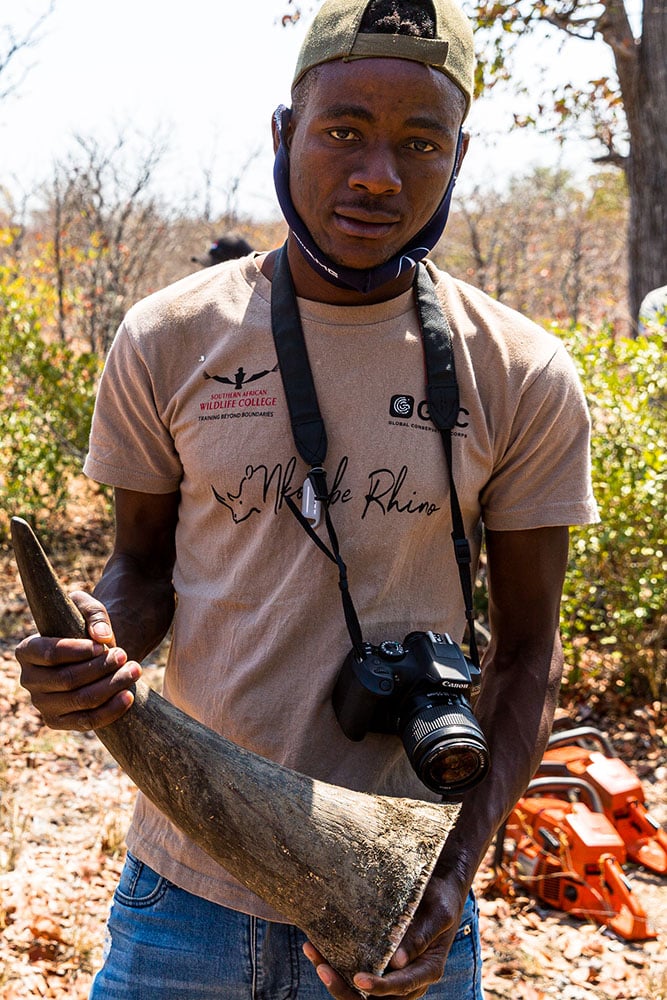
Photo Credit: Mike Kendrick
ML: What was the most challenging part of the selection process for you personally? Was it the mental or physical side?
GM: It was the mental side. If you are not a person who is sure about what he or she wants, you might swear under your breath at the instructors because they challenge you. They challenge you in different ways. They want to check if you can lift things just like that. That was a little bit challenging for me. Sometimes I was like what is going on, but I said no, I will push, and the last day, the survival day, was a challenge because we had to carry these 20kg bags. Two of our teammates were injured, seriously injured, and the remaining three of us had to figure out how to move their bags too. It was during this moment that I realized how in nature conservation, and with field rangers specifically, that we need to work together, there must be a team dynamic to work towards the same goals. So, we fought very hard and we found a solution.
ML: When you found out that you had been invited to take part in this opportunity, how did you feel?
GM: I was very excited. I was recommended by Mr. Mike Kendrick, who knows me because he taught me wildlife photography at Sabi Sands Game Reserve. The moment he told me that I had been selected I started training. I said, guys, now it is time for me to train. I have to prepare for the selection. I didn’t know what was going to happen, but I knew that something would happen, and I would need to be strong.
ML: Mr. Mike from Wild Shots Outreach (a program teaching young people from disadvantaged communities about wildlife photography) is an incredible guy. What can you tell me about him, about Wild Shots, and about how Wild Shots helped you move forward in life?
GM: Mr. Mike is a motivator to me. He is a father to me, he is a friend to me, he is everything to me. I feel like God has connected us because without him I would never have had the opportunity to stand in front of people and be proud of who I am and be proud of the company that is sponsoring me, the Global Conservation Corps. Now I am under GCC because of Mr. Mike. Let me say for Wild Shots Outreach, he supported me a lot, there were a lot of things that I was not able to afford financially but he was the one who helped me with every problem that would arise. Wild Shots and GCC were the ones who funded me up until the end of the course so I would like to say that Mr. Mike is such a good, kind, person. I don’t know who I can compare him to, but he is more than a person.
ML: How are you enjoying the ranger course? What are you learning?
GM: Personal hygiene, taking care of yourself, being a hard worker, being positive about what you are doing, and team dynamics so that you can work as a team to achieve the same goals. We also learn firearm handling, to be fast on our tasks, to think about what is important, and not about things that have no value. And if something happens, which is very important, leave everything and do the best you can. So, discipline, even when you are taking some lunch or eating, do everything with discipline, with order. The work is discipline, always when you are walking, how to hold your rifle, this is what we are currently learning.
ML: What do you find the most exciting part of being a ranger?
GM: For me being a ranger is being the protector of conservation, you are the bulletproof shield for the animals. Let me talk about the rhinos, it is you and the rhino, you must stand in front of the rhino, you must protect the rhino, anything can happen to you. You need to sacrifice a lot, even the animal you want to protect can change its mind and charge you, and the person who is going after the rhino can change their mind and shoot you, so you need to be strong, you need to sacrifice a lot. Being a ranger for me is a good opportunity because there are a lot of things you can do. Maybe in three years I can become a section ranger and go to the very top level, so that is a great opportunity. I also like that you can talk to the animals, the elephants, the birds, we are learning a lot about them, about tracks and stuff, so it is a very good opportunity for me to be a ranger.
ML: When you go home, the kids must love you, how do you inspire them?
GM: I think, when I go home I want to teach them how to conserve nature from the youngest ones to the eldest, I need to teach them the importance of the animals and even the domestic animals that we have in our homes. We must love them all and treat them equally. And hopefully, by doing so, I will inspire them to love nature and love growing up in nature because there are a lot of jobs and careers in nature. Many young people don’t consider jobs in conservation because maybe they are not inspired at home, they want to be an engineer, for example, which is not a problem, it is fine, but we still need people in conservation too to take care of nature. One day I will retire and it will be the turn of the young guys so I need to teach them, as Nelson Mandela once said: “If you want to change the world, teach the children.” Like this tomorrow will be better for them.
ML: Is there anything else you would like people to know about you?
GM: For me, I want to be a ranger, and from being a ranger I want to wake up one day as a CEO working in the environment sector, that is something that motivates me. My background, where I come from, where I started, also motivates me a lot. I am happy that now I have experience, I have knowledge, and I have a passion for doing something which is going to boost our economy and change the lives of people for future generations. I want people to know me, I want them to know the better things about me. Tomorrow will not be the same as today, tomorrow they will see a different Godfrey, a Godfrey in conservation.

